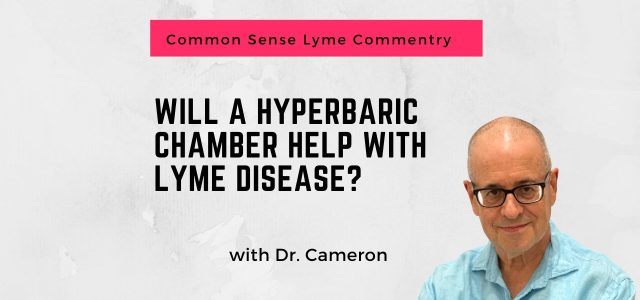
Hyperbaric oxygen therapy (HBOT) is often promoted as a way to relieve symptoms of chronic Lyme disease. Some patients seek it out when other treatments haven’t worked. But in my experience, HBOT doesn’t address the root problem—a persistent tick-borne infection.
So let’s break it down—in the form of a clinical dialogue.
💬 A Clinical Dialogue on Hyperbaric Oxygen and Lyme Disease
Cameron: One of my patients had been struggling with fatigue, pain, and brain fog for months. She asked, “Would a hyperbaric chamber help me feel better?” She’d read that oxygen could make it harder for Borrelia to survive.
Colleague: I hear that more and more. The idea is that Borrelia prefers low-oxygen environments, so increasing oxygen might help. But it’s far from a comprehensive approach.
Cameron: Exactly. While some patients report feeling better after HBOT, I’ve had more success when we focus on identifying and treating the persistent infection itself. In this patient’s case, we uncovered both Lyme disease and Babesia. HBOT wouldn’t have addressed the co-infection.
Colleague: So instead of starting HBOT, you focused on antimicrobial treatment?
Cameron: Yes. Once we treated both infections appropriately, her symptoms began to improve. I’ve seen this pattern time and again. While HBOT might play a supportive role for some, it doesn’t replace direct treatment.
Colleague: Is there strong research behind HBOT?
Cameron: The research is limited. Some small studies suggest temporary symptom relief, but no large trials confirm long-term benefit. It remains experimental when it comes to tick-borne diseases.
🔬 What the Research Shows
-
Small studies (e.g., Austin, 1997) and anecdotal reports suggest some patients experience symptom relief after HBOT—but results are inconsistent.
-
Borrelia is sensitive to oxygen, but HBOT’s effects on persistent infection are not well understood.
-
HBOT does not target Babesia, Bartonella, or other co-infections.
-
No large clinical trials show long-term benefit in Lyme disease.
-
Symptom relief may reflect reduced inflammation, not resolution of infection.
⚖️ Why Clinical Judgment Still Matters
-
I’ve seen patients pursue HBOT with little change—until we treated the underlying infection.
-
Some feel temporarily better but relapse because co-infections were missed.
-
HBOT is costly, time-intensive, and not covered by many insurance plans.
-
Patients deserve a thoughtful, infection-focused treatment strategy—not a generalized therapy.
🩺 What I Do in My Practice
-
I evaluate for persistent Lyme disease and co-infections like Babesia or Bartonella.
-
I base treatment on clinical signs and response—not just test results.
-
I prioritize antimicrobial and antiparasitic treatments tailored to the individual.
-
I’ve occasionally seen patients try HBOT, but I always prioritize antimicrobial treatment first—it’s where I’ve seen the most lasting results.
-
I track progress closely and adjust treatment based on outcomes, not theories.
🧭 Final Thoughts
Hyperbaric oxygen therapy may offer temporary relief for some—but it doesn’t address the infection at the core of most chronic Lyme cases I see.
My patients do best when we dig deeper and treat the problem directly.
If symptoms persist, the question isn’t whether you’ve tried enough alternative therapies.
The real question is: Has the infection truly been addressed?
That’s where I focus my attention. And that’s where I’ve seen the most meaningful progress.



HBOT is definitely is one of the antidote that work when it comes to different forms of parasites. When pure oxygen is infiltrated into areas that the blood and/or antibiotics cannot reach, this is where the oxygen penetrates parts of the soft tissue areas where persisters hide. HBOT creates an alkaline state verses acidosis which parasites hate.
i am going through hell since Covid
I have patient with Lyme whose symptoms mimic long covid. I also patient with both whose long covid improves once their lyme disease is treated
I had Lyme for a couple years.
Worked with assorted and respected practitioners and seemed to achieve some pushback only to have a reoccurrence.
Can anyone in your circle give me a Lyme guy in chicago.
I’m a 71 yrold Luddite who was spoiled by the concept of face to face 🙂
HBOT has been studied in malaria with studies showing it lowers parasite load and brain dysfunction. It also proven as an adjunct treatment to mold, Chrohns and other complications that happen with us that are seriously ill. It can also help with hemolytic anemia and low oxygen before during and after treatment plus at higher ATA can break biofilm, release stem cells and strengthen immunity. Even cooler is that is can start that anticoagulation cascade that breaks down clots and fibrin. There is a place for it in a comprehensive plan and seems to help medications work faster.
I have colleagues used HBOT despite the lack of published evidence. The first study out of Texas did not find HBOT helpful. Since they we know more about the complexity of Lyme and clinical trials making difficult to study